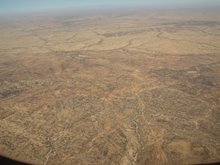My experience is that the reluctance of international efforts to shift from humanitarian rhetoric to developmental or to provide substantial support to political processes is closely associated with institutional competition between INGO and the bilateral/multilateral agencies. Part of the problem is that the most influential actors on Darfur within Western polities are INGOs. With popular support mobilised through emotive advocacy campaigns these organisations are able to inflict real political costs on democratic politicians. The problem is that INGOs are effectively tied to humanitarian work, lacking the political mandates and the resources to effectively support a political process or become deeply involved in developmental planning.
As a result, their work, although essential and highly effective, restricts the majority of their advocacy within Western countries to emergency relief or crisis intervention. Using Durkhiem's distinction between profane and the sacred, these campaigns thus portray the political work of conflict resolution as profane, rather than the sacred purity of humanitarian action. This emphasis is in turn is passed on, through the capitals of donor countries, to set the priorities for embassies and international agencies.
The substantial problem here, however, lies in international institutions – the UN and the World Bank are frequently, unwilling or unable to make strong, public cases for the support for political processes. Instead of leading on issues, they often follow - despite their vast budgets often receiving good analysis.
Beyond Darfur the most important example of such an issue is the upcoming elections in 2009. At present, no single agency or NGO, with the exception of the Friedrich Ebert Stiftung (I have no affiliation) and the British Embassy (again no affiliation), are taking an effective lead on preparing for these elections. The first since 1986, it is estimated that 60% of the population has never voted before and I have frequently encountered basic misconceptions on the nature of democracy/elections within Sudan. Most disturbingly, the perception that elections are purely conflict resolution mechanisms between parties – with no real appreciation of the secondary functions of democracy such as protection of minority rights and checks and balances. As a result, the risk of violent conflict, within the centre of Sudan around the elections is growing, with very few international actors prepared to act in any way to reduce this likelihood.
The largest failure here is UNMIS – who consistently refers to its mandate to legitimize its failure to address elections effectively. This failure is a perfect example of why a UN force in Darfur, regardless of composition, is unlikely to be able to improve the situation, as like UNMIS it will lack political will to effectively address political problems. Instead it will adopt humanitarian functions that allow it to be well portrayed in the international media, whilst neglecting the messy, profane and essential work of political activism.
Subscribe to:
Post Comments (Atom)

No comments:
Post a Comment